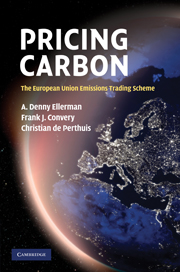Book contents
- Frontmatter
- Contents
- List of figures
- List of tables
- List of boxes
- List of appendices
- Frequently used abbreviations
- Preface
- 1 Introduction
- 2 Origins and development of the EU ETS
- 3 Allowance allocation
- 4 Effects of free allocation
- 5 Market development
- 6 Emissions abatement
- 7 Industrial competitiveness
- 8 Costs
- 9 Linkage and global implications
- 10 Conclusions
- Annex: The interaction between the EU ETS and European electricity markets
- Appendix A Sequence of events in the development of the EU ETS and Linking Directives
- Appendix B Data tables
- Bibliography
- Index
4 - Effects of free allocation
Published online by Cambridge University Press: 05 July 2011
- Frontmatter
- Contents
- List of figures
- List of tables
- List of boxes
- List of appendices
- Frequently used abbreviations
- Preface
- 1 Introduction
- 2 Origins and development of the EU ETS
- 3 Allowance allocation
- 4 Effects of free allocation
- 5 Market development
- 6 Emissions abatement
- 7 Industrial competitiveness
- 8 Costs
- 9 Linkage and global implications
- 10 Conclusions
- Annex: The interaction between the EU ETS and European electricity markets
- Appendix A Sequence of events in the development of the EU ETS and Linking Directives
- Appendix B Data tables
- Bibliography
- Index
Summary
Introduction
The preceding chapter discussed the issues of how and on what basis allowances were allocated. This chapter addresses a second question: what is the effect of allocation when the affected installations receive a free allocation of allowances? The debate surrounding auctioning and free allocation suggests that it matters a great deal. The purpose of this chapter is to explain how, and in what ways, allocation does (and does not) matter.
Price effects and allocation effects
Two key distinctions must be made. The first concerns the effects of free allocation itself, distinct from what would be attributed to the price created by the cap-and-trade system. If full auctioning is the means chosen for distributing allowances to installations, there will be no allocation effects because there would be no free allocation. The only effects would be those associated with the price for CO2 emissions. Free allocation raises the question of whether the allocation itself has effects beyond or additional to those associated with the carbon price.
In the classic economic explanation advanced by Coase (1960), an up-front, fixed assignment of rights to emit will have no effect on the supply and demand for the good in question – in this case emissions. Under certain idealized conditions, such as complete information or the absence of significant transactions costs, trade would occur until marginal valuations and marginal costs are equalized.1
The distinction between allocation and price effects, and the assumed independence of these effects, also raise questions about behaviour.
- Type
- Chapter
- Information
- Pricing CarbonThe European Union Emissions Trading Scheme, pp. 85 - 121Publisher: Cambridge University PressPrint publication year: 2010



